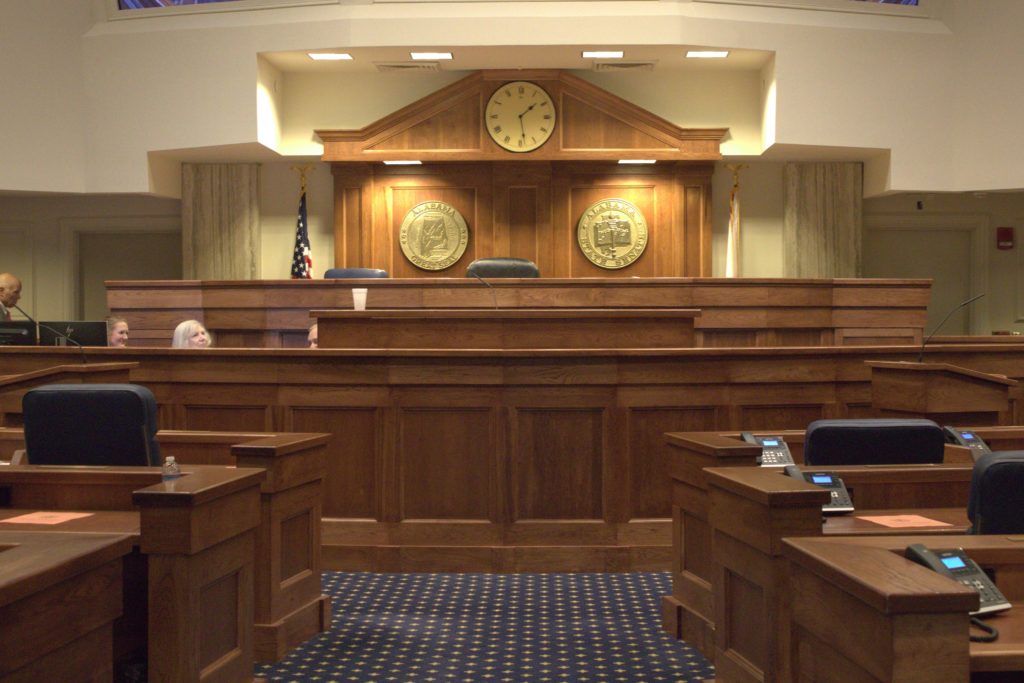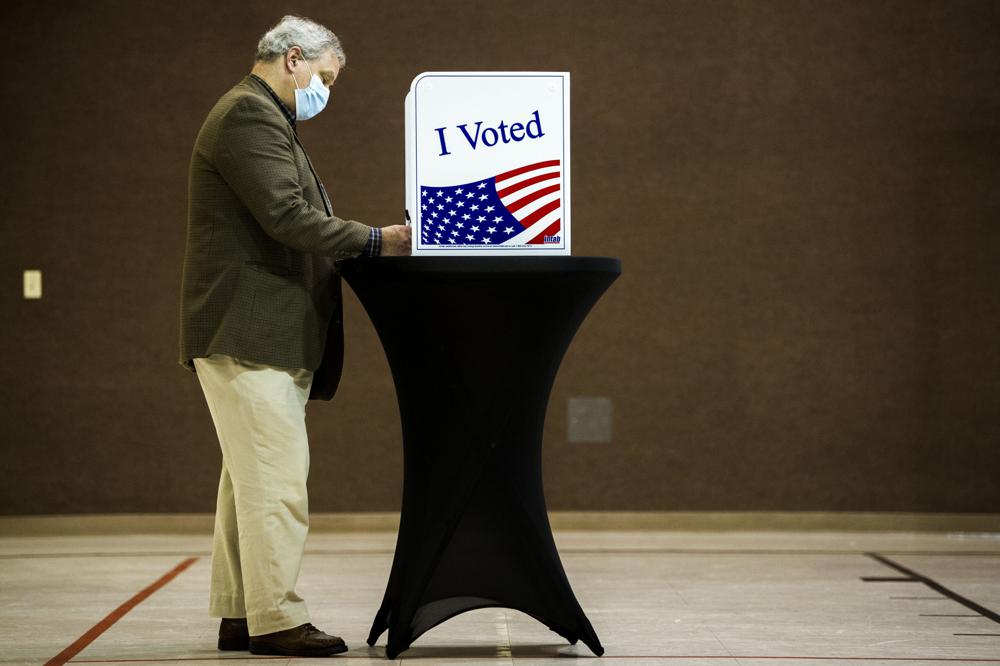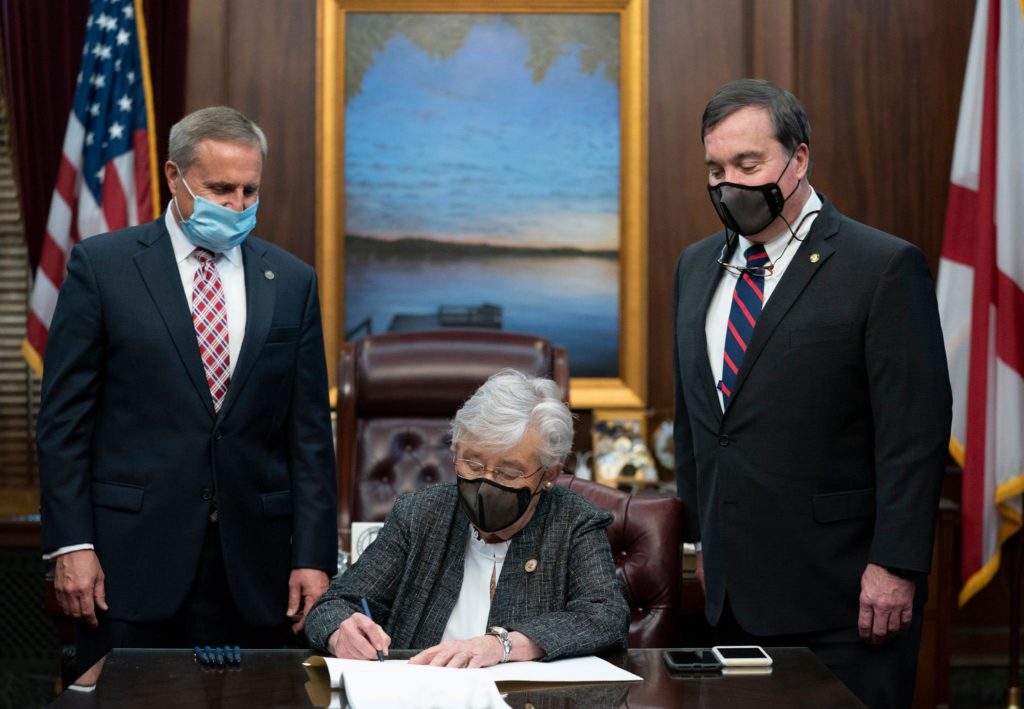Justin Bogie: Alabamians deserve more than a one-time tax rebate

“I think they deserve it.” That is what House Majority Leader Nathaniel Ledbetter (R-Rainsville) said last week when asked about the possibility of using state government’s record revenue surplus to provide Alabamians with a one-time tax rebate. And he is right. The people of Alabama do deserve relief from over-taxation, near record-high inflation, and high gas prices. It is a good thing that the House Majority Leader recognizes that. But they deserve so much more than only a one-time rebate check that will provide only limited economic relief. They deserve permanent tax reforms that will provide benefits to Alabamians for decades to come. To recap, last month, State Senator Arthur Orr (R-Decatur) began floating the idea of giving a one-time tax rebate to Alabamians as a way to “send money back to the people.” Since then, other lawmakers, including Ledbetter, have indicated their support for the proposal. Other than Orr saying the rebates should be “substantial,” there is no indication of the target in mind. According to the Tax Foundation, as of July 2022, 11 state legislatures have chosen to return revenue surpluses to citizens through tax rebates. Rebate amounts ranged from a low of $50 to a high of $850. However, over the same period, 11 states enacted legislation to permanently reduce individual income tax rates, and eight states passed corporate income tax reductions. Fourteen states reduced corporate and/or individual income tax rates in 2021. Four of the states offering tax rebates to citizens also enacted individual income tax cuts in 2022. If Alabama lawmakers are determined to go the tax rebate route, then in conjunction with other long-term tax cuts is the only acceptable way. There are several reasons that Alabamians deserve more relief than one-time rebates alone will provide. First, rebates will not slow the unprecedented growth of state government. By the end of 2022, Alabama’s government is on pace to spend nearly $11.7 billion, 35.5% growth since 2019. Through August, the state already had about $1.7 billion more in cash on hand than it needs to pay existing obligations through September. The last few years have proven that the more money our state government takes from citizens, the more it will put back into itself. That is not what Alabamians, who elected a conservative supermajority to the legislature just four years ago, want. Most would claim that they want a smaller government with less interference in their personal lives or businesses. If steps are not taken to reduce the number of tax dollars flowing into state government, it will continue to grow year after year. What amounts to a one-time stimulus check will not curb the growth of Alabama’s state government. It will merely allow lawmakers to take credit for doing something to provide relief to citizens and then get back to the business of spending your money. Beyond the problem of doing nothing to stop the growth of state government, rebate checks could make economic conditions worse in the short run. The federal government sent out numerous rounds of stimulus checks in 2020 and 2021 under the guise of pandemic relief. However, there is little dispute that the stimulus checks stoked inflation, impacting the same people the money was intended to help. They also provided another disincentive to work. Rebates are a political tool with few consequences for government and little benefit for Alabamians. Kansas lawmakers went so far as to call Democratic Governor Laura Kelly’s rebate plan a “gimmick.” Unless Alabama lawmakers use all the available surplus funds in 2023 for rebates, which is unlikely, it will not even stop government from expanding next year. They could also add fuel to the inflation fire, lowering the purchasing power of your money. Of course, more government spending will have the same effect. The best path forward for providing tax relief to Alabamians is through lower tax rates. A rebate could be a complimentary piece to a broader tax reform package but is not a substitute. Last week, the Alabama Policy Institute (API) called on Governor Kay Ivey and the Alabama Legislature to enact a minimum of $750 million in permanent tax cuts for citizens. This could be achieved through a combination of individual or corporate income tax rate cuts, full elimination of the state’s 4 percent sales tax on groceries, repealing the $.10 gas tax increase, or other options outlined in API’s 2023 policy platform. Revenue surpluses in excess of $750 million each year could be returned to citizens through a rebate. Hardworking Alabamians deserve permanent tax relief that will allow both individuals and industry to flourish for generations to come. They do not want merely a one-time handout. Justin Bogie is the Senior Director of Fiscal Policy for the Alabama Policy Institute.
Seven State Senate seat races to watch

All 35 State Senate seats are up for grabs in the November 8 general election. Republicans hold a 27 to 8 margin over Democrats in the current makeup of the Alabama Senate. The Alabama Republican Party is running candidates in 29 seats. The GOP is defending all of the 27 seats they currently hold and are running candidates in two districts currently held by Democrats. Alabama Democrats are defending the eight seats they currently hold and are challenging the GOP in six districts currently held by Republicans. Libertarians currently hold no seats in the Alabama Senate but are running twelve candidates in State Senate races. There are a number of contested State Senate races on the November ballot. These are the seven races with the most chance of becoming interesting. Democrat Lisa Ward is challenging Republican incumbent State Sen. Gerald Allen in Senate District 21. Both of these candidates are well known in the Tuscaloosa area. Allen has represented the district for three terms and served in the Alabama House of Representatives before that. Ward is a former city councilwoman who is very active in the community. According to filings with the Alabama Secretary of State’s office, Allen has a $204,872.68 campaign account balance entering September, which includes August contributions of $8,250. Ward, the challenger, meanwhile raised $23,149.76 in August and has a cash balance of $31,968.94 entering September. Neither faced a primary opponent. Democrat Kim Lewis versus Republican incumbent State Sen. Tom Butler in Senate District 2. Butler has represented Madison County in the legislature for parts of five decades, but this is one of the fastest growing areas in the state, and there are thousands of new people that bring different politics with them to the area. Lewis is hoping that an increasingly purple Madison County will result in a win. Butler was pushed hard in the Republican primary by former State Sen. Bill Holtzclaw. Butler raised $44,500 in the month of August and enters September with $38,166.63. Lewis raised $7,830 in August and comes into September with $27,859.70. In Senate District 33, incumbent Democratic Sen. Vivian Figures faces Republican challenger Pete Riehm. This has been a very safe Democratic district consisting of the poorest parts of Mobile as well as Mobile County suburbs like Prichard, but redistricting meant that the new district now goes deep into Baldwin County and picked up the very prosperous and heavily Republican community of Spanish Fort. This district went from very blue to purple thanks to the legislature’s redistricting and efforts to “unpack” Black voters from majority-minority districts. Is it purple enough for a Republican to take it away from the Democrats? That is for the voters to decide on November 8. Sen. Figures raised $31,500 in the month of August to enter September with $110,497.02. Riehm had contributions of $19,577.54 in August and enters September with $60,911.31. Democrat Sherri Lewis versus Republican Jay Hovey in Senate District 27. Hovey, an Auburn City Councilman, just narrowly defeated incumbent Tom Whatley (R-Auburn) in a heavily contested GOP primary. Hovey, who has the challenge of unifying Republicans, raised $85,500 in contributions in August to enter September with a cash balance of $70,074.17. Reese meanwhile raised $1,806.20 in August to bring a total of $2,703.33 into the month of September. Senate District 23 – here, there are three candidates vying for the open seat formerly held by State Sen. Malika Sanders-Fortier, who vacated the seat in an unsuccessful bid for governor. Democrat Robert Lee Stewart narrowly defeated former State Sen. Hank Sanders in a hard-fought Democratic primary runoff in June. Stewart faces both a Republican in Michael Nimmer and a Libertarian in Portia Stephens. Stewart raised $16,987 in August to bring $17,872.84 into September. The Libertarian, Stephens, reported raising $2,060 in August to finish the month with $6,285 in cash on hand. The Republican, Nimmer, has not filed a campaign finance report. Alabama does not have general election runoffs, so when there are multiple candidates, the candidate with the most votes wins even if they got less than half of the votes. There is another three-way contest in Senate District 29. There, incumbent Republican Sen. Donnie Chesteen (R-Dothan) faces both Democrat Nathan “Nate” Mathis and Libertarian Floyd “Pete” McBroom. Matthis reported raising no money in August, but he has $5,719.36 in cash on hand. McBroom has not filed a campaign finance report with the Secretary of State’s office yet. The incumbent, Chesteen, raised $25,500 in August to enter September with $327,660.86. In Senate District 12, Republican Keith Kelley is battling Democrat David McCullars for the open seat currently held by Sen. Del Marsh. Kelley raised $29,658.24 in August and has $65,102.13 in cash on hand. McCullars only raised $265 in the month of August and entered the month of September with $4,377.15 in cash on hand. Kelley had a hard-fought Republican primary. This is a district that has given Marsh a close call in the 2014 general election. In other contested Alabama Senate races · SD3 incumbent Arthur Orr (R-Decatur) faces Libertarian Rick Chandler · SD4 incumbent Garlan Gudger (R-Cullman) faces Libertarian Jacob Marlow · SD6 incumbent Larry Stutts (R-Sheffield) faces Libertarian Kyle Richard-Garrison · SD7 incumbent Sam Givhan (R-Huntsville) faces Democrat Korey Wilson · SD15 incumbent Dan Roberts (R-Mountain Brook) faces Libertarian Michael Crump · SD17 incumbent Shay Shelnutt (R-Trussville) faces Libertarian John Fortenberry · SD24 incumbent Bobby Singleton (D-Greensboro) faces Libertarian Richard Benderson · SD25 incumbent Will Barfoot (R-Montgomery) versus Libertarian Louie Woolbright · SD28 incumbent Billy Beasley (D-Clayton) faces Libertarian David Boatwright · SD35 incumbent David Sessions (R-Grand Bay) faces Libertarian Clifton Hudson Republican incumbents Tim Melson, Greg Reed, Steve Livingston, Clay Scofield, Andrew Jones, Randy Price, April Weaver, Jabo Waggoner, Greg Albritton, Clyde Chambliss, Chris Elliott, and Jack Williams are all running unopposed. Republican newcomers Lance Bell in SD11 and Josh Carnley in SD31 are also unopposed in the general election. Democratic incumbents Rodger Smitherman, Linda Coleman-Madison, and Kirk Hatcher are all also unopposed in the general election. State Rep. Merika Coleman is unopposed in SD19, which is being vacated by the retirement of Priscilla Dunn (D-Bessemer). In 2022 Republican candidates in Alabama have received $44,321,108.97 in contributions. Political Action Committees have received $17,846,761.05. Democratic candidates have received $6,629,199.43, and all other candidates have received just $111,950.87. The general
Alabama AFL–CIO endorses dozens of Libertarians in races without a Democratic candidate

The Alabama chapter of the American Federation of Labor and Congress of Industrial Organizations (AFL-CIO) has endorsed 26 Libertarians for office across the state. While the group isn’t specifically for Democratic candidates only, the sheer number of Libertarian candidates being endorsed this election cycle has been something not seen before in Alabama. According to its website, the mission of the AFL-CIO is to “represent the interests of working people at the state and local level.” Nationally, the AFL-CIO is the largest federation of unions in the U.S., representing more than 12 million active and retired workers. The largest unions currently in the AFL-CIO are the American Federation of Teachers (AFT), the American Federation of State, County, and Municipal Employees (AFSCME), and the United Food and Commercial Workers (UFCW). According to Independent Political Report, the Alabama chapter released a list of candidate endorsements that included 73 Democrats, nine Republicans, and 26 Libertarians. Seven of the Libertarian candidates are running for State Senate, and 19 are running for the Alabama State Legislature. According to the Libertarian Party of Alabama (LPA) website, the party is committed to individual liberty and personal responsibility, a free-market economy, and a foreign policy of non-intervention, peace, and free trade. This year, the LPA had until May 24 to turn in a petition with 51,588 signatures in order to achieve party status in Alabama and for their candidates to be on the ballot. The party was successful and turned in its list of candidates to Clay Helms on May 19. This is the first time in 20 years that the party is on the general election ballot in Alabama, which gives voters an opportunity to choose candidates outside of the Democratic and Republican parties. Danny Wilson, an Alabama Libertarian Party leader, has expressed frustration over what he sees as a “media blackout” concerning libertarian candidates that haven’t been covered for the upcoming Alabama elections. Wilson is also a libertarian candidate for the Alabama Senate seat in the 19th district. Wilson stated on Twitter, “LPA (Libertarian Party of Alabama) will have 69 candidates in various races across the state. Fifty-five of those races that would have been unopposed-coronations with extra steps. Media Blackout hampers third-party candidates almost as much as ballot access and straight ticket voting. There are other options.” In June, Wilson received an endorsement from Alabama Cannabis Coalition. Just last week, the Alabama AFL-CIO endorsed libertarian candidate Rick Chandler for Alabama State Senate District 3. District 3 includes Morgan County and portions of western Madison and eastern Limestone counties. Chandler, a retired engineer from Huntsville, is a challenging Republican incumbent Arthur Orr. Chandler thanked the organization for the endorsement and gave credit to unions. “The Libertarian party continuously seeks to bring in citizens from across all walks of life to form a more harmonious society,” Chandler said. “Even those workers not part of a union have benefitted from their activities to help people achieve an acceptable standard of life, since large corporations must now strive harder to keep their workforces well compensated and working in a safe environment.” Libertarian candidates are also contesting a number of other statewide positions, including Governor, Lieutenant Governor, Commissioner of Agriculture and Industries, Auditor, Treasurer, and two spots on the Public Service Commission. If any of these Libertarian candidates can successfully earn 20% of the total vote, ballot access for the Party will be guaranteed into the next cycle. If they fail, they must restart the process and get signatures again. The general election is on November 8, 2022.
Alabama AFL-CIO endorses Alabama State Senate District 3 candidate Rick Chandler

The Alabama American Federation of Labor and Congress of Industrial Organizations (AFL-CIO) has endorsed the Libertarian Party candidate, Rick Chandler, for Alabama State Senate District 3. District 3 includes Morgan County and portions of western Madison and eastern Limestone counties. Chandler, a retired engineer from Huntsville, is a challenging Republican incumbent Arthur Orr. Nationally, the AFL-CIO is the largest federation of unions in the U.S., representing more than 12 million active and retired workers. The largest unions currently in the AFL-CIO are the American Federation of Teachers (AFT), the American Federation of State, County, and Municipal Employees (AFSCME), and the United Food and Commercial Workers (UFCW). Chandler thanked the organization for the endorsement and gave credit to unions. “The Libertarian party continuously seeks to bring in citizens from across all walks of life to form a more harmonious society,” Chandler said. “Even those workers not part of a union have benefitted from their activities to help people achieve an acceptable standard of life, since large corporations must now strive harder to keep their workforces well compensated and working in a safe environment.” Chandler continued, “The Alabama AFL-CIO represents many hard-working, tax-paying, independent-minded Americans. I greatly appreciate their endorsement and look forward to working with them after we win this fall.” The Libertarian Party gained ballot access this year for the first time in more than two decades following a big push to collect enough signatures in support of the party. Danny Wilson, an Alabama Libertarian Party leader, has expressed frustration over what he sees as a “media blackout” concerning libertarian candidates that aren’t being covered for the upcoming Alabama elections. According to the News Courier, Chandler has also been endorsed by LetBamaVote, an organization that advocates the rights of citizens to place statutes and constitutional amendments on ballots and to ratify or reject statutes.
Dan Roberts says legislature will look at ways to help taxpayers

State Sen. Dan Roberts (R-Mountain Brook) spoke on Sunday with Alabama Today about tax relief and reform proposals that the legislature is looking at in order to help Alabama families “that are really struggling with inflation.” The state is flush with cash due to the strength of the Alabama economy and federal stimulus dollars, so lawmakers are anticipating carrying over as much as $2.5 billion from the 2022 fiscal year into FY2023, which begins on October 1. Roberts told Alabama Today that he is still looking at Sen. Arthur Orr’s (R-Decatur) plan to rebate some of the surplus back to taxpayers in the form of one-time tax rebates. “I would not be opposed to that,” Roberts commented. “I still need to read the bill though.” Another proposal that Roberts thinks that the legislature will consider is eliminating the state’s four percent tax on groceries. “I like the concept of that,” Roberts said. “We need to consider anything we can do to help our people right now that are really struggling with inflation.” Roberts continued, “This is a big issue. I am an engineer, so I like to look at numbers. I would find that most interesting. I would support that if we can make the numbers work.” “I think it is closer to $500 million,” Roberts said of the tax revenues brought in by the four percent grocery tax. There are concerns by many in the legislature that the billions of dollars that the Trump and Biden administrations poured into the economy with CARES and the American Rescue Act are creating a temporary “sugar high” and that state revenues might fall back to where they were pre-pandemic. “You have to take a look at the total influx of moneys coming into the state,” Roberts explained. Another big issue that the legislature is likely to take up is renewing Alabama’s economic incentives. Alabama Commerce Secretary Greg Canfield is urging the legislature to pass incentives renewal legislation. “These are pay-as-you-go incentives. They are sustainable,” Canfield told reporters following a meeting of the legislative oversight committee. “Pay-as-you-go means companies have to perform and create new revenues before they can ever be paid an incentive. And that’s the best checks-and-balances system.” Roberts explained that Canfield has a bill to modernize incentives to help bring businesses to Alabama. “I am not opposed to the concept of that bill.,” Roberts stated. “We have to remain competitive with other southeastern states, and incentives are a major component of that,” Roberts explained. “We are competing against the other 48 continental U.S. States as well as foreign countries.” “We passed, and the Governor signed the Alabama competitiveness Act In 2021,” Roberts said. “It adds a great deal of competitiveness. Alabama businesses and corporations are getting their tax returns back now, and they are pleased with what we have done.” Roberts said that much of the focus of legislators right now is on the November 8 general election. “I do have a Libertarian running against me,” Roberts said. “There is a lot of work that goes into a Senate race. I am very focused on our situation locally.” Roberts was optimistic that Republicans will be able to hold their supermajority in the Alabama Senate. “I am looking at every other race across the state,” Robert said. “There are some guys I still haven’t met,” Roberts said, referring to Republican State Senate nominees. Dan Roberts represents Alabama Senate District 15. SD15 includes parts of Jefferson, Shelby, and Talladega Counties. Unless Governor Kay Ivey calls a special session, the State Legislature will not meet again until January and then for a brief organizational session where rules and leadership will be set for the next quadrennium. The next regular session will not begin until March. To connect with the author of this story, or to comment, email brandonmreporter@gmail.com.
Kay Ivey signs Numeracy Act into Law, eliminating Common Core standards completely

Governor Kay Ivey on Tuesday signed Senate Bill 171, the Alabama Numeracy Act, into law. The Numeracy Act, sponsored by Sen. Arthur Orr and Rep. Alan Baker, is a strategic approach to improving mathematics achievement. In a press release, Ivey stated, “Literacy and numeracy are the blocking and tackling of education, plain and simple. For our students to have positive educational outcomes and to have success later in life, we must ensure proficiency in both reading and math is achieved. That is why, here in Alabama, we are focusing on what matters, and that is core instruction – not any of the other nonsense. Alabama parents wholeheartedly agree with that.” In 2019, Gov. Ivey and the State Board of Education eliminated Common Core from Alabama’s mathematics standards, and with the governor’s signature, this legislation eradicates these standards once and for all. “We cannot accept passing our students along without the proper foundation as the status quo, and that is why I have proudly signed the Alabama Numeracy Act into law. This strategic, targeted, and wise investment in our children will provide necessary resources, will include high-quality instruction, and will keep our schools accountable. The Alabama Numeracy Act delivers on my commitment to place the same sense of urgency on math as we rightfully have on reading,” Ivey continued. “Students will not only understand how to find an answer, but will have the mathematical reasoning needed for the in-demand STEM jobs in Alabama,” Ivey concluded.
Alabama lawmakers advance historic pay raises for teachers

Alabama lawmakers are poised to approve the largest pay raises in a generation for experienced public school teachers in an effort to keep educators from leaving state classrooms. The Alabama Senate voted 32-0 Thursday for the budget that would raise minimum salaries for teachers with nine or more years experience. The raises would range from 5% to nearly 21%, depending on years of experience. Sen. Arthur Orr, the chairman of the budget writing committee, said the goal is to encourage experienced teachers to stay in the classroom and to attract more students to the field of teaching. The spending plan now moves back to the Alabama House of Representatives, where House leaders have expressed support for the raises. “Hopefully, seeing those pay raises, we’ll have more people staying in education rather than saying, ‘I’m out, I’m tired,’” Orr, a Republican from Decatur, said. The size of the raise would be based on a teacher’s years of experience. A teacher with a bachelor’s degree and 20 years of experience would see their salary rise from $51,810 to $57,214. A teacher with a master’s degree and 25 years of experience would see their pay rise from $61,987 to $69,151. Teachers with less than nine years of experience would see a 4% raise. Orr said the state has competitive salaries for new teachers compared to surrounding states, but the state is “falling behind” in salaries for mid-career educators. The proposal would also provide an automatic 1% yearly raise and do away with a salary cap that currently ends step raises after 27 years of teaching. Orr said that should give educators — and those considering teaching as a career — some minimum guarantee of how their salaries will increase over time. School systems in Alabama and across the country have reported concerns about teacher shortages, particularly as the coronavirus pandemic accelerated a wave of retirements. That has led states to look at pay increases and other measures to try to recruit and retain educators. Amy Marlowe, executive director of the Alabama Education Association, said the positive response from teachers has been “just overwhelming.” “This will do more to keep people in the classroom than what we originally thought,” Marlowe said. Marlowe said school systems are seeing a teacher shortage in all subjects and in all grades as educators leave the classroom for retirement or other jobs. She said the state is at the precipice of a staffing cliff unless something is done. Under the current proposal, teachers with 35 years experience would see a record-setting yearly raise of nearly 21%, Marlowe said. Marlowe said teachers last saw large pay raises in the 1980s when lawmakers approved 15% increases for two consecutive years during George Wallace’s last term as governor. Mississippi Gov. Tate Reeves on Wednesday signed legislation authorizing a pay raise for that state’s public school teachers, long among the lowest-paid in the nation. Republished with the permission of the Associated Press.
Alabama lawmakers OK math initiative for elementary students

Alabama lawmakers on Tuesday gave final approval to a math initiative that will use instructional coaches, assessments, and interventions to try to boost the state’s perpetually lagging test scores. The Alabama House of Representatives voted 76-24 for the Senate-passed bill dubbed the Alabama Numeracy Act. The Alabama Senate accepted House changes to the bill that now goes to Alabama Gov. Kay Ivey. Sen Arthur Orr, the sponsor of the bill, said the goal is to make sure elementary students in kindergarten through fifth grades have an adequate foundation in math so they can succeed in school and later in adult life. “If we don’t provide a strong foundation for them in mathematics and in literacy, the problem becomes they get frustrated in school and tend to drop out or misbehave,” Orr, a Republican from Decatur, said. The bill would create an Elementary Mathematics Task Force to provide state education officials with recommendations for core instruction and mathematics intervention; use assessments to identify students in kindergarten through fifth grades; provide intervention and summer learning programs; and deploy instructional coaches to elementary schools. The math coaches, like current reading coaches, would work with teachers on improving instruction and not directly with students. Schools that continued to lag in performance could face state intervention if they do not meet progress targets. Alabama’s math performance in fourth and eighth grades ranked last among states in the 2019 National Assessment of Educational Progress, often called “The Nation’s Report Card.” “Doing nothing is not an option,” Rep. Barbara Drummond, a Democrat from Mobile, said during debate. The Legislative Services Agency estimates the Numeracy Act will cost the state $114 million each year. The hiring of math coaches would be the largest expense, costing about $80 million annually. Republished with the permission of the Associated Press.
Steve Flowers: Incumbency reigns supreme in State Senate

Being an incumbent state senator in Alabama is like owning that seat. The level of re-electability odds is probably better than that of an incumbent congressman, which is about the same as being elected to a seat in the Russian Communist Politburo. Being a freshman state senator in Alabama is a more powerful position than being a freshman U.S. congressman, especially if you want to affect public policy. Many times, a 50-year old, successful person who is interested in seeking a representative role will approach me and seek my advice about running for either a state senate seat or an open congressional seat. I will quickly advise them that as a state senator, you are one of 35, and you immediately have an impact on your first year as a state senator. However, if you win a congressional seat, you are one of 435. Because of the seniority system, it will be 15 years before they know your name in Washington and 25 years before you are chairman of a committee, and then it is time to retire. In the 35-member Alabama Senate, there are 27 Republicans and 8 Democrats – a pretty supermajority for the GOP. Twenty-four of the twenty-seven senate Republicans are running for reelection. Republicans Jimmy Holley, Del Marsh, and Jim McClendon are retiring. These seats will be filled by another Republican. Therefore, when the Senate organizes next January, the 27 to 8 supermajority will remain the same. The lines are drawn to protect incumbents on both sides of the aisle. The Constitution provides the power of the pencil for legislators to draw their own legislative districts. Seventeen of the 24 Republican incumbents have no opposition in the Republican Primary. Of the seven Republican senators who drew a Republican opponent, they only got an opponent the last day of qualifying, and their opposition is token at best. All 24 Republican incumbents will be reelected. If my prognostication is correct, that is a 100% re-electability rate. There are only two GOP incumbents that were first thought to have viable opponents. Tom Whatley, at first blush, was rumored to have a race. However, polling and fundraising reveal he will win easily. The only interesting race may be in the Huntsville area, where incumbent Tom Butler is being challenged by Bill Holtzclaw, who previously served in that senate seat. The rule of incumbency also prevails on the Democratic side of the aisle. There is only one Democratic seat open. Priscilla Dunn holds the post in name only. She has never attended a senate day in Montgomery for this entire quadrennium. The Senate has, in essence, been operating with 34 senators. In actuality, the Democrats have only seven senate seats. There are 150,000 residents of Jefferson County who have had no voice or vote in the Alabama Senate for four years. There are two Democratic House members vying to fill this seat, Merrika Coleman and Louise Alexander. Ms. Coleman is favored to win this open Senate seat. The cadre of leadership on the Democratic side will return, including powers Bobby Singleton, Rodger Smitherman, and Vivian Figures. Hank Sanders will return to represent Selma and the Black Belt after a four-year sabbatical. His daughter was in the seat this last quadrennium. The entire leadership of the Republican-led Senate will return unopposed, including Greg Reed, Jabo Waggoner, Clay Scofield, Arthur Orr, Greg Albritton, Steve Livingston, Gerald Allen, and especially Clyde Chambliss. They will be joined by a superstar freshman class, who will become even more powerful. This class of leaders includes Will Barfoot, Garlan Gudger, April Weaver, Sam Givhan, Donnie Chesteen, and a trio contingency of Baldwin/Mobile senators Chris Elliott, Jack Williams, and David Sessions. Another member of this sterling class, Dan Roberts of Jefferson, has an opponent but will be reelected. The three open Republican seats and one Democratic open seat will give us some interesting senate races to follow. One of, if not the most important ingredients which creates the power of incumbency is the almighty campaign dollar. Money is the mother’s milk of politics. Most of this campaign money comes from Special Interest Political Action Committees. Ninety percent of those special interest dollars go to incumbents. Thus, over 90% of Alabama state senators are reelected. See you next week. Steve Flowers is Alabama’s leading political columnist. His weekly column appears in over 60 Alabama newspapers. He served 16 years in the state legislature. Steve may be reached at: www.steveflowers.us.
Issues to watch in the 2022 legislative session

Alabama lawmakers return to Montgomery on January 11 for the 2022 legislative session. Here are some issues to watch as the session begins. PANDEMIC RELIEF FUNDS Lawmakers face decisions on how to spend over $1.5 billion in state relief funds from the American Rescue Plan. Congress allocated $2.12 billion for Alabama through the American Rescue Plan. The state has so far received $1 billion and has $580 million remaining after using $400 million for prison construction and $80 million to reimburse hospitals and nursing homes. Key lawmakers say they expect infrastructure projects to be among the proposed uses. GUN PERMITS Lawmakers are expected to again debate legislation that would do away with the need to get a permit to carry a concealed handgun. The legislation, known as “constitutional carry” to proponents, has been introduced for several years but never passed as it faced opposition from law enforcement. “I think, based on the feedback that I’m getting from members of the Senate, there’s going be a lot of interest in the constitutional carry legislation. I’ve heard that from both House and Senate members. So I think it will definitely be an issue that will be debated and will be something that we will deal with in session, for sure,” Senate President Pro Tempore Greg Reed said. ABORTION Nearly two dozen House Republicans are backing legislation similar to a Texas law that would ban most abortions and allow anyone to file civil lawsuits against violators and collect damages. The bill titled the “Alabama Heartbeat Act” would prohibit medical providers from performing an abortion once cardiac activity is detected, usually around six weeks and before some women know they are even pregnant. The measure would allow private citizens to file civil lawsuits against anyone who “aids or abets” an abortion and to collect at least $10,000 in damages for each performed abortion. GAMBLING Lottery and casino legislation will again be introduced in Alabama’s upcoming legislative session — with the goal of getting the measure before voters in November — but the outlook for the proposal is unclear. Some leaders in the House of Representatives have expressed skepticism that the bill will get a vote this year. Republican Sen. Greg Albritton of Atmore said he plans to propose a constitutional amendment that would include a state lottery, a compact with the Poarch Band of Creek Indians, and a yet-to-be-determined number of other gambling sites. Gambling legislation has failed in past sessions under a mix of conservative opposition and disputes over the number of casinos and who would have casino licenses. EDUCATION BILLS Republican Sen. Arthur Orr of Decatur is proposing an overhaul in math instruction that would include more math coaches in schools, summer programs, and interventions. Eventually, in 2028 fifth grade students would need to show they were meeting certain math benchmarks to move to the sixth grade under the proposal. Lawmakers previously approved a similar promotion requirement for third-graders with reading. However, Alabama Gov. Kay Ivey has said she will ask lawmakers for a one-year delay of the reading promotion requirement after the pandemic interrupted classrooms. The high-stakes promotion requirement for third-graders is currently set to take effect this spring. REMOVING RACIST LANGUAGE The Committee on the Recompilation of the Constitution has proposed a plan to strip racist language, such as provisions about segregated schools, from the state’s governing document. The sections were invalidated by court rulings but remain in the document. It also reorganizes the massive, sprawling document that has nearly 1,000 constitutional amendments to try to make it more user-friendly. If approved by lawmakers, it would go before voters in November 2022. TRANSGENDER TREATMENT BAN Lawmakers could again debate an attempt to forbid doctors from providing gender-confirming hormone treatment, puberty blockers, or sex reassignment surgery to treat transgender minors. The Alabama Senate approved the bill in 2021, but it did not get a vote in the House of Representatives. Arkansas became the first state to enact such a measure, but a federal judge in June blocked it from taking effect. ELECTION YEAR INFLUENCE Alabama legislators are up for reelection this year. For lawmakers seeking another term, the session brings the last opportunity to shore up their records before voters make their decisions. That traditionally brings a flurry of legislation and resolutions that legislators believe will appeal to their voters. The primary is May 24. However, lawmakers will also feel the need to finish up the session quickly in order to hit the campaign trail. Republished with the permission of the Associated Press.
Steve Flowers: State Senate will have little turnover in 2022

2022 was anticipated to be an exciting competitive election year. However, it is going to be a yawn of a political year. If you thought there was no competition for the constitutional offices and the House of Representatives seats in next year’s elections, then you have not seen anything like the lack of turnover in the Alabama State Senate. Incumbency will prevail. In fact, the power of incumbency in the Alabama State Senate is on par with the incumbent return percentage for Congress, which is probably comparable to the Russian Communist Politburo. There are 35 state Senate seats; 27 of the 35 are held by Republicans. Out of the 27 Republican state senators, 24 are running for reelection, and all 24 probably will be reelected. Almost all of them have no opposition. The Democratic minority has just as high a reelection bar. Of the eight Democrats, seven probably will be running unopposed. The only Democrat not running will be Priscilla Dunn, who has not been to the Senate this entire four-year term. Most of the first-term State Senators have never met her. According to rumors, she is in poor health and cannot attend. The 150,000 people in Senate District 19 in Jefferson County have been without a voice or vote in the Alabama Senate for four years. The three retiring Republican State Senators are giants. Del Marsh, Jimmy Holley, and Jim McClendon’s shoes will be hard to fill. These three seats will be filled by new Republicans. The 27-8 super Republican majority will continue. State Senator Del Marsh (R-Anniston) has been a leader in the Senate for 23 years. He served as President Pro Tempore of the Senate most of that time. He ran a very effective ship of state. State Senator Jimmy Holley (R-Elba/Coffee) is an icon. He was a master of Senate rules. He also was a mentor to a good many young senators. State Senator Jim McClendon (R-St. Clair) will be sorely missed in the state senate. The gentleman from St. Clair served with honor and distinction for eight years in the State Senate and 12 years before that in the House of Representatives. This freshman class of senators has bonded and work cohesively with the veteran leaders. The Freshman Class includes Will Barfoot (R-Pike Road), Tom Butler (R-Huntsville), Sam Givhan (R-Huntsville), Dan Roberts (R-Jefferson), Garlan Gudger (R-Cullman), Randy Price (R-Lee), Donnie Chesteen (R-Geneva/Houston), David Sessions (R-Mobile), Jack Williams (R-Mobile), Chris Elliott (R-Baldwin) and Andrew Jones (R-Cherokee/Etowah). Senator April Weaver (R-Shelby/Bibb) won her seat recently when Cam Ward left to become head of Pardons and Paroles. April Weaver previously served in the House of Representatives. She is the only female GOP Senator. She has a bright future. All twelve of these new senators have done an excellent job, and all will be reelected. Ten of the twelve will probably run unopposed. There are some exceptionally talented and dedicated veterans in the Senate that will coast to reelection. Most, if not all, will be unopposed. This stellar group of legislative leaders includes President Pro Tem Greg Reed (R-Jasper/Walker), Senate Majority Leader Clay Scofield (R-Guntersville), Senator Clyde Chambliss (R-Autauga/Elmore), Senator Steve Livingston (R-Scottsboro/Jackson), Senator Shay Shelnutt (R-Jefferson), Senator Tom Whatley (R-Auburn/Lee), Senator Gerald Allen (R-Tuscaloosa), Senator Greg Albritton (R-Escambia) the Chairman of the Senate Finance General Fund, Senator Arthur Orr (R-Decatur) Chairman of Senate Finance Education, and last but certainly not least, the legendary Jabo Waggoner (R-Vestavia), who chairs the Senate Rules Committee. There will be some outstanding veteran Democrats returning to the State Senate. There are several giants, who include Senator Bobby Singleton (D-Greene), Senator Vivian Figures (D-Mobile), Senator Rodger Smitherman (D-Birmingham), and Senator Billy Beasley (D-Barbour). Senator Kirk Hatcher (D-Montgomery) is new to the senate. However, he bears watching. He is gregarious, likable, and a quick study. He will be effective for Capitol City. The senate abounds with outstanding leadership on both sides of the aisle. The lack of competition the members are garnering is a testament to their good work. This returning group of leaders could well portend for a successful future quadrennium. With this kind of experience and leadership, they will also be an independent group. They will not be a rubber stamp for the governor. See you next week. Steve Flowers is Alabama’s leading political columnist. His weekly column appears in over 60 Alabama newspapers. He served 16 years in the state legislature. Steve may be reached at www.steveflowers.us.
Justin Bogie: Tax cuts seem to be everywhere – except in Alabama’s future

Kansas, one of a handful of states alongside Alabama that still fully taxes the sale of food, recently announced a bipartisan plan to “Axe the Food Tax.” Just before Thanksgiving, North Carolina Gov. Roy Cooper signed a budget into law that will make sweeping changes to the state’s tax code, fully repealing the corporate income tax by the end of the decade and cutting the personal income tax rate by 1.26% over the next five years. And the tax cuts that North Carolina just enacted and that Kansas is proposing are not outliers. According to the Tax Foundation, North Carolina became the 12th state to enact personal or corporate income tax rate cuts in 2021. So, what did Gov. Kay Ivey and the Alabama Legislature do in 2021, and what could be on the horizon? Despite taking more revenue from citizens than ever before, there was no meaningful effort to reduce taxes this year. Instead, the 2021 Regular Legislative Session was consumed by a failed effort to legalize, and of course, heavily tax casino-style gaming in Alabama. Lawmakers also found time to legalize the use and sale of medicinal marijuana in Alabama, which could mean financial windfalls for state government and the chosen few businesses allowed to grow, process, and distribute marijuana in Alabama. Given the progress made by other states and Alabama’s failure to pass any meaningful tax reforms this year, surely they are coming in 2022, right? If tax cuts are in the cards, our elected state leaders are not talking about them. Most lawmakers seem focused on how to spend money that has already been taxed from citizens or find ways to take even more. Just this week, State Sen. Greg Albritton, chairman of the Senate general fund budget committee, said that he expects gaming legislation to be a hot topic when the legislature reconvenes on January 11. According to a report from Yellowhammer News, Albritton said that he was hopeful gaming legislation would pass in the upcoming session. And while he said getting control of existing gaming in the state was a driving factor, money may be the biggest motivation. Albritton said, “We’ve got to have some taxing on it. We’ve got to have some benefits on it.” It was estimated that the 2021 gaming legislation would have brought in $260 million to $393 million annually, just from a new tax on gaming revenue. Much of that revenue would have, of course, come out of the pockets of Alabamians. What are other priorities? Sens. Del Marsh and Bobby Singleton have bonuses for retired state workers and teachers on their minds. Marsh’s pre-filed bill would give a minimum bonus of $300 to retirees. Senate education budget chairman Arthur Orr has indicated support not only for retiree bonuses but another pay raise for the state’s teachers. If those priorities pass, Orr has said that it might be the right time to look at limited tax breaks for retirement age and lower-income Alabamians. But surely Gov. Kay Ivey is talking about taking less money from the people of Alabama? Not exactly. On Monday, Ivey announced a state-sponsored plan to expand electric vehicle use in Alabama. Interestingly, when asked if she would move to an electric vehicle, Ivey said her car is “still in good shape,” but she might consider a change in the future. Perhaps Ivey is like many other Alabamians who don’t know much about or have little interest in driving an electric vehicle. According to the Alabama Department of Revenue, nearly five million passenger vehicles were registered in 2020. Less than 3,000 of those vehicles were electric. Are these really the major priorities for Alabama citizens? If the recent gubernatorial election in Virginia is any indication, no. After a 12-year drought in statewide elections for Virginia Republicans, Glenn Youngkin was able to win because he focused on conservative principles such as school choice and lowering taxes. Exit polling conducted by Cygnal found the driving issues for Youngkin voters were education, taxes, the economy, and public safety, among others. Electric vehicles and expanded gambling appeared nowhere on the list. Few would argue that Alabama is a conservative state. Yet, the current tax and spend priorities of state lawmakers do not reflect conservative principles. If the governor and Republican supermajority legislature want to get back to those roots, they need only look to other states for inspiration. Justin Bogie is the Senior Director of Fiscal Policy for the Alabama Policy Institute.


